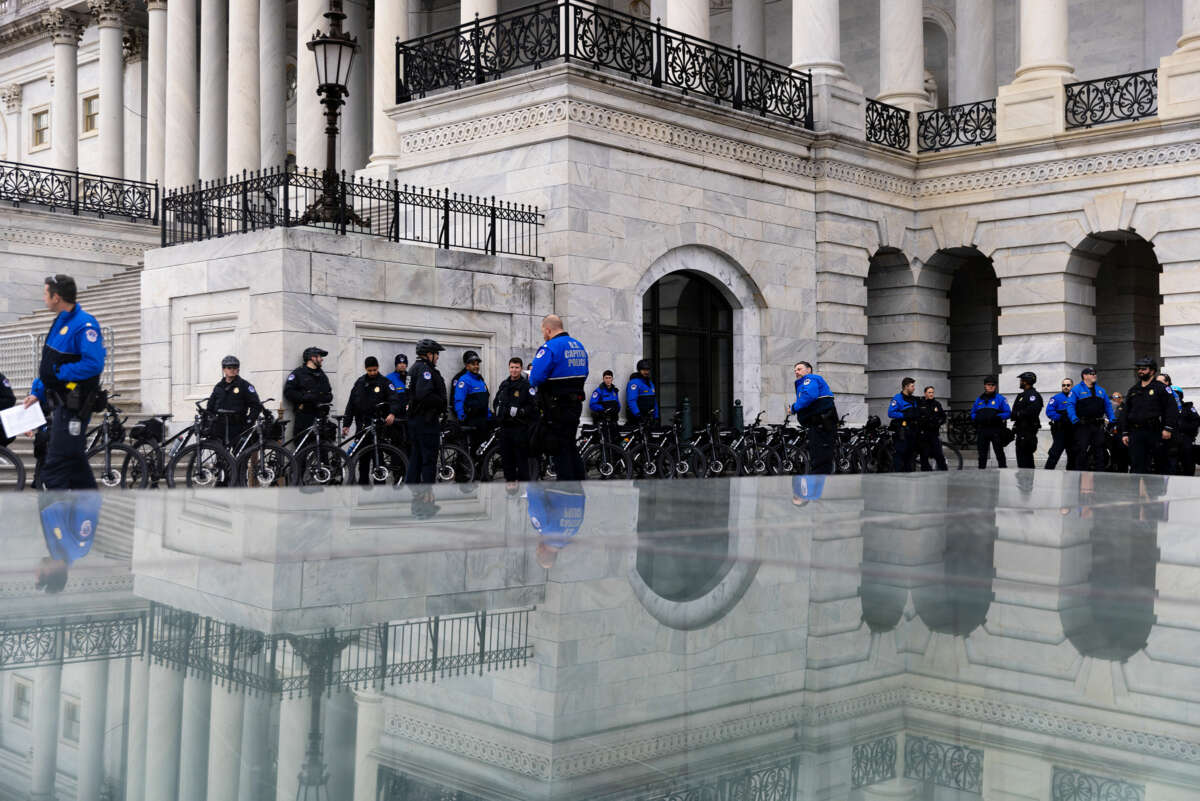In a State of the Union speech predictably marked by half the chamber applauding the president and the other half of the chamber sullenly disapproving (along with some outright expressions of rancor from far right congress people), President Joe Biden earned one of the few bipartisan standing ovations after stating his support for the police. “I know most cops are good, decent people. They risk their lives every time they put on that shield,” Biden declared.
In addressing police violence, the president used his State of the Union speech to double down on his reformist agenda, which was encapsulated in his May 2022 executive order on federal law enforcement (“The Executive Order on Advancing Effective, Accountable Policing and Criminal Justice Practices to Enhance Public Trust and Public Safety”). The order shares many features of the George Floyd Justice in Policing Act, which died in Congress after the uprisings following the police murders of Breonna Taylor and George Floyd in the summer of 2020. Biden’s executive order, which applies specifically to federal law enforcement, clarified use-of-force standards, provided anti-bias training, intensified data collection on the use of force and established a database detailing instances of misconduct by federal law enforcement. It also banned no-knock raids and chokeholds.
While Democrats and Republicans bicker over the debt ceiling and when and where to shoot down a spy balloon from China, there is little difference between the parties when it comes to willfully misdiagnosing the problem exposed by Tyre Nichols’s murder, even in the aftermath of one of the most heinous police beatings of a Black man ever captured on video.
For some policy makers, Nichols’s death was the product of “dangerous” police culture. South Carolina Democrat James Clyburn tweeted, “A dangerous culture of violence has permeated far too many police departments in this country.” South Carolina Republican Sen. Tim Scott stated, “This was a man [Nichols] beaten by the power of the state. We must unite against this blatant disregard for human life especially from those we trust with immense power and responsibility.”
Meanwhile, in Atlanta, Democratic Mayor Andre Dickens blamed activists for the January police-perpetrated killing of forest defender Tortuguita and the arrest of activists seeking to stop the city from destroying the Weelaunee Forest and constructing a $90 million law enforcement training facility known as “Cop City.” Dickens claimed the nonviolent activists were responsible for the violence perpetrated by the police. He even deployed the old “outside agitators” trope, suggesting the activists were outsiders who were standing in the way of legitimate development of the forest. Clearly, for Dickens, the Atlanta Police Department was justified in doing whatever was necessary to ensure that the construction of the facility would progress.
The problem with these explanations — whether they are cultural or grounded in the belief that police are justified in protecting economic development — is that they obscure the structural problems pointed out by many activists who have called for defunding the police: Law enforcement’s monopoly control over the use of force; local, state and federal governments shoveling billions of dollars into law enforcement; the political power of police officer associations and unions and these institutions’ willingness to defend officers who kill citizens and demonize activists; and the notion that the “thin blue line” is necessary to protect the social, political and economic order of racial capitalism.
As abolitionist movement lawyer Derecka Purnell pointed out insightfully in her response to Nichols’s beating in Memphis, liberal police reform, especially the kinds that Biden touts, can’t prevent law enforcement from killing anyone. Unfortunately, it seems that the demand to “stop killing us” is perpetually ignored by both Democratic and Republican policymakers.
Banning chokeholds in New York City did not stop NYPD officers from choking Eric Garner to death. Body cameras did not stop the Memphis police officers from yanking Nichols out of his car and beating him with no provocation. In fact, the Memphis officers sought to use their body cameras to their advantage by constructing a narrative during and after the beating.
Families’ calls for accountability after suffering the loss of a loved one comprise one of the few paths available for justice in a violent carceral system predicated on punishment after the fact and not on nonviolent prevention. Ultimately, Biden’s doubling down on police reformism should serve as a reminder of the goal after the deaths of Eric Garner, Michael Brown, Aura Rosser, Sandra Bland, Freddie Gray, Breonna Taylor, George Floyd, Keenan Anderson, Tortuguita and Tyre Nichols, and many others — to prevent the police from killing us by replacing them with more life-giving institutions designed to strengthen communities.
We cannot prevent the police from killing us if we continue to support an inherently violent system of public safety. We must continue to raise the critical fundamental questions about policing in the U.S. — How did policing in the U.S. develop and why? Who and what does the police protect in this country? And, to echo abolitionists like Purnell, Mariame Kaba, Andrea Ritchie and Ruth Wilson Gilmore, does proposed police reform strengthen or delegitimize police power? Experienced organizers must join with those who are new to the issue and unite in seeking answers to those questions while organizing to transform public safety, protest state violence and protect ourselves and the environment against policing and racial capitalism.
Speaking against the authoritarian crackdown
In the midst of a nationwide attack on civil liberties, Truthout urgently needs your help.
Journalism is a critical tool in the fight against Trump and his extremist agenda. The right wing knows this — that’s why they’ve taken over many legacy media publications.
But we won’t let truth be replaced by propaganda. As the Trump administration works to silence dissent, please support nonprofit independent journalism. Truthout is almost entirely funded by individual giving, so a one-time or monthly donation goes a long way. Click below to sustain our work.
